Plumbing Code 1
1/99
There's no tags or description
Looks like no tags are added yet.
Name | Mastery | Learn | Test | Matching | Spaced |
|---|
No study sessions yet.
100 Terms
A. September 30, 1999
When was the Board of Master Plumber Resolution No. 04 Series of 1999 that covered the Adoption and Promulgation of RNPCP 1999 approved ?
A. September 30, 1999 B. September 30, 1998 C. September 31, 1999 D. September 29, 1999
Revised Effluent Regulation of 1990
What is DAO No. 35 Series of 1990 all about ?
A. Revised Effluent Regulation of 1990
B. Revised Water Usage/Classification Water Quality Criteria
C. Philippine National Standard for Effluent Discharge of 2007 D. Philippine National Standard for Effluent Discharge of 2007
Philippine National Standard for Drinking water of 2007
What is DOH Administrative Order No. 2007 0012 all about ?
A. Revised Effluent Regulation of 1990
B. Revised Water Usage/Classification Water Quality Criteria
C. Philippine National Standard for Effluent Discharge of 2007 D. Philippine National Standard for Drinking Water of 2007
1.7 m x 1.8 m
According to Accessibility Law , the accessible toilet compartments shall have the following a minimum area of
A. 1.6 m x 1.8 m
B. 1.5 m x 1.8 m
C. 1.8 m x 1.8 m
D. 1.7 m x 1.8 m
2.25 , 1500
According to Accessibility Law , a turning space of sqm . with a minimum dimension of mm for wheelchair users shall be provided outside water closet cubicles .
A. 2.25 , 1500
B. 2.15 , 1500
C. 2.25 , 1800
D. 2.30 , 1800
20
According to Accessibility Law , a minimum of one accessible to persons with disabilities water closet in every floor for every regular water closet
A. 20
B. 25
C. 15
D. None of the above
450 mm
According to Accessibility Law , the maximum height of toilet seat for persons with disabilities is
A. 450 mm . B. 500 mm C. 400 mm D. 430 mm
C. 800 mm
According to Accessibility Law , the maximum height of lavatory for persons with disabilities is
A. ) 800 mm
B. 700 mm
C. 600 mm
D. 650 mm
A. 480 mm .
According to Accessibility Law, urinals shall be of the wall-hung type and should have elongated lip; the maximum height of the lip should be ____ from the floor.
A. 480 mm
B. 700 mm
C. 600 mm
D. 500 mm
A. 480 mm
According to Accessibility Law , urinals shall be of the wall - hung type and should have elongated lip ; the maximum height of the lip should be from the floor .
A. 480 mm .
B. 700 mm
C. 600 mm
D. 500 mm
D. Php7.00
In accordance with NBCP , how much be the plumbing fee for plumbing installation of a water closet in excess of one plumbing unit ?
A. Php 2.00
B. Php 9.00
C. Php 8.00
D. Php7.00
A. Php 2.00
In accordance with NBCP , how much be the plumbing fee for plumbing installation of a shower head in excess of one plumbing unit ?
A. Php 2.00
B. Php 9.00
C. Php 8.00
D. Php 7.00
A. Php 24.00
In accordance with NBCP, how much be the plumbing fee for plumbing installation of a digestive chamber having 5 m3?
A. Php 24.00
B. Php 29.00
C. Php 20.00
D. Php 7.00
A. True
No permit shall be issued for the installation, alteration or repair of any private sewage disposal system or part thereof for any lot which can connect with an existing public sewer fronting the lot.
A. True
B. False
C. May be
D. Need for approval to AA
B. Tributary/contributing sewer
It is classified as an intercepting sewer branch where pipe is made of either vitrified clay or concrete pipe laid in an open trench. It is generally smaller in diameter installed not more than 3 meters below the street grade and terminate into the intercepting sewer.
A. Intercepting/trunk line sewer
B. Tributary/contributing sewer
C. Storm drain
D. Street sewer
B. 18th -19th century
The Filipino plumbers were assigned the task of maintaining, repairing/remodeling plumbing system in all pueblos or town, church and government buildings during?
A. 16th -17th century
B. 18th -19th century
C. 19th -20th century
D. 15th -16th century
B. 20th century
Based on the history of plumbing practice, plumbing took a great leap at the turn of the American soldiers, engineers, Thomasite teachers, doctors and evangelist?
A. 16th century
B. 20th century
C. 20th century
D. 18th century
A. Building Code of the Philippines
Before Martial Law, Republic Act No. 6541known as the?
A. Building Code of the Philippines
B. Fire Code of the Philippines
C. Sanitation Code of the Philippines
D. Plumbing Code of the Philippines
D. General Harrison
Based on the history of plumbing practice, who was the Governor General issued letter of instruction on proper waste disposal when epidemics like cholera, leprosy and other contagious disease engulfed in the Philippines.
A. General Fortunato
B. General Mc. Arthur
C. General Malvar
D. General Harrison
B. John F. Hass
The first chief of the Division of the Plumbing Construction and Inspection.
A. John M. David
B. John F. Hass
C. John A. Meracolo
D. John F. Hidalgo
A. Jamie M. Cabase
Who was the NAMPAP President spearheaded the updating of the RNPCP in 1996?
A. Jamie M. Cabase
B. Hemogenes Pobre
C. Fortunato H. Amosco
D. Teodoro pastor.
C. 1935
When was the NAMPAP organized and had it registered with the Securities and Exchange Commission.
A. 1934
B. 1932
C. 1935
D. 1937
C. Brazed joint
Any joint obtained by joining of metal parts which alloys will melts at a temp. higher than 449 degree centigrade but lower than the melting temp of the parts to be joined.
A. Soldered joint
B. Butt joint
C. Brazed joint
D. Mechanical joint
B. Circuit vent
A group vent pipe which starts in front of the extreme fixture connection on a horizontal branch and connects to the vent stack. (See Loop vent)
A. Common vent
B. Circuit vent
C. Local vent
D. Relief vent
A. Common
The part of a plumbing system designed and installed to serve more than one appliance, fixture, building or system.
A. Common
B. Supply
C. Chase
D. Interconnection
C. Confined space
A room or space having a volume less than 1.4 cu.m with 250 kCal of the aggregate input rating of all fuel burning appliances installed in that space.
A. Open space
B. Conditioned Room
C. Confined space
D. Isolated space
B. Contamination
An impairment of the quality of the potable water which creates an actual hazard to the public through poisoning or spread of disease by sewage, industrial waste also defined as high hazard.
A. Pollution
B. Contamination
C. Disease
D. Black water
A. Continuous vent
A vertical vent that is a continuation of a drain to which the vent connects. to
A. Continuous vent
B. VSTR
C. STVR D. Main vent
C. Continuous waste
A drain connecting the compartments of a set of fixtures to a trap connecting other permitted fixtures to a common trap.
A. Continuous vent
B. Waste branch
C. Continuous waste
D. Soil stack
B. Critical level
Marking on a backflow prevention device or a vacuum breaker is a point conforming to approved standards and establish by the testing laboratory
A. Marker
B. Critical level
C. Flood level
D. Flood level rim
B. Flush tank
A tank located above or integral with water closet, urinal or similar fixture for flushing or removing excrement in the fixture.
A. Flush valve
B. Flush tank
C. Flushometer valve
D. Flushometer tank
A. Flush valve
Is a device located at the bottom of the tank for the purposed of flushing water closet and similar fixtures
A. Flush valve
B. Flush tank
C. Flushometer valve
D. Flushometer tank
B. Flush valve
Is integrated within an air accumulator vessel which is design to discharge a predetermine a quantity of water into fixture for flushing purposes.
A. Flushometer valve
B. Flush valve
C. Flushometer tank
D. Flush tank
B. Flushometer valve
. Is a device which discharges a predetermined quantity of water into fixtures for flushing purposes and is actuated by direct water pressure.
A. Flushometer tank
B. Flushometer valve
C. Flush valve
D. Flush tank
A. Gooseneck
A return bend of small- sized pipe, one end of which is about 30 cm. long and other end is about 7.5 cm long. Commonly used as a faucet for a pantry sink.
A. Gooseneck
B. Elbow 45 deg
C. Elbow 90 deg
D. Return bend pipe
C. Grease interceptor
An interceptor of at least 3 cu.m capacity to serve or more fixtures and which is remotely located.
A. Sump
B. Pit
C. Grease interceptor
D. Receptor
B. Ground water
The water that stands or passes through the ground
A. Natural water
B. Ground water
C. Surface water
D. Rainwater
A. Group vent
A branch vent that performs its function for two
A. Group vent
B. Yoke vent
C. Utility vent
D. Circuit vent
B. Pressure
The normal force exerted by a homogeneous liquid or gas, per unit of area on the wall of the container.
A. Static head
B. Pressure
C. Energy
D. Isolated space
C. Static pressure
The pressure existing without any flow motion
A. Critical pressure
B. Normal pressure
C. Static pressure
D. Static head
C. Residual pressure
The pressure available at the fixture or water outlet ; allowance is made for pressure drop due to friction loss, head, meter and other losses in the system during maximum demand period.
A. Static pressure
B. Normal pressure
C. Residual pressure
D. Critical pressure
B. Primary branch
Is the single sloping drain from the base of a stack to its junction with the main building drain.
A. Secondary branch
B. Primary branch
C. Building drain
D. Branches
C. Private sewer
A building sewer, which receive the discharge from more than one building and conveys it to a public sewer, private sewage disposal system or other point of disposal.
A. Public sewer
B. Public used
C. Private sewer
D. Private used
C. Privy
An outhouse or structure used for the deposition of excrement.
A. Septic tank
B. Cesspool
C. Privy
D. Seepage pit
B. Privy vault
A pit beneath a privy where excrement connects.
A. Distribution box
B. Privy vault
C. Sump
D. Seepage pit
C. Public sewer
A common sewer directly controlled by public authority to which all abutters have equal right of connection.
A. Private sewer
B. Drainage
C. Public sewer
D. Main sewer
C. Blue
Potable water piping color coded pipe.
A. Red
B. Gray
C. Blue
D. Orange
C. Service pipe
The pipe from the street water main or other source of water supply to the building served.
A. Main sewer pipe
B. Distribution pipe
C. Service pipe
D. Fixture supply pipe
B. Sewage
Any waste water containing animal or vegetable matter in suspension or solution and may include liquids containing chemicals in solution.
A. Black Water
B. Sewage
C. Potable water
D. Storm water
D
D. Shaft
A vertical opening through a building for elevators, dumbwaiters, light, ventilation or similar purposes.
A. Septic tank
B. Conduit
C. Pipe
D. Shaft
B. Plumbing appliance
Any one of special class of device or equipment or intended to perform a special plumbing function, such as motors, heating elements and pressuretemperature elements.
A. Plumbing appurtenance
B. Plumbing appliance
C. Plumbing fixtures
D. All of the above.
C. Plumbing appurtenance
A manufactured device or prefabricated assembly or an on the job assembly of component parts, and serves as adjust to the basic piping system and plumbing fixtures.
A. Plumbing fixtures
B. Plumbing appliance
C. Plumbing appurtenance
D. All the above
C. Plumbing fixtures
An approved type installed receptacles, devices or appliances supplied with water or receive liquid or liquid borne waste and discharge such waste into the drainage system
A. Plumbing appliance
B. Plumbing appurtenance
C. Plumbing fixtures
D. Plumbing system
D. 17th century
The birth of the plumbing profession in the Philippines was traced back to.
A. 12th century
B. 15th century
C. 16th century
D. 17th century
B. Spaniards
Based on the history of plumbing practice" The walled city" known as Intramuros was established as a model community by the?
A. Americans
B. Spaniards
C. Mexican
D. Japanese
A. November 28, 1967
When was the first approved which inclusion of "asbestos cement pipe" as an approved material.
A. November 28, 1967
B. September 21, 1988
C. October 23, 1986
D. November 21, 1985
B. R.A 1378
Known as "Plumbing Law of the Philippines" was signed by President Ramon Magsaysay in June 18, 1955.
A. R.A 1374
B. R.A 1378
C. R.A 1060
D. R.A 9514
C. January 28 , 1959
When was the National Plumbing Code of the Philippines promulgated and approved by Malacañang?
A. June 18, 1955
B. December 21, 1999
C. January 28 , 1959
D. February 14, 1959
B. 1966-1969
When was the Board of Examiners for Master Plumber and NAMPAP prepared the Curriculum for Plumbing Engineering and approved by DepED at Feati University?
A. 1966-1988
B. 1966-1969
C. 1955-1999
D. 1945-1965
A. Feati University
Plumbing Engineering was first introduced to what School or University?
A. Feati University
B. University of the Philippines
C. De LaSalle University
D. University of Manila
C. Plumbing Code for the City of Manila
City Ordinance No. 2411 known as the?
A. National Drinking Water Standard
B. Clean Air Act
C. Plumbing Code for the City of Manila
D. Clean Water Act
B. Engr. Fortunato H. Amosco
Who is the Chairman of Board of Master Plumbers (BOMP) where the NAMPAP submittedt he draft code to him in October 1999.
A. Engr. John Jones
B. Engr. Fortunato H. Amosco
C. Engr. Raymundo Gumapac
D. Engr. Catalino Casapunan
A. Hermogenes Pobre
Who is the Chairman of PRC where adopted RNPCP 1999 which Pres. Joseph Estrada approved last Dec. 21, 1999.
A. Hermogenes Pobre
B. Teodoro Pastor
C. Roberto Feliciano
D. Raymondo Reyes
C. December 21, 1999
RNPC 1999 was approved by Pres. Joseph Estrada last_________.
A. June 27, 1956
B. April 19, 1958
C. December 21, 1999
D. July 25, 1999
C. Shielded coupling
. An approved elastomeric sealing gasket with an approved outer shield and a tightening mechanism.
A. Union patente
B. Nipple
C. Shielded coupling
D. Plug
B. Single family dwelling
A building design as a home by the owner of such building, and shall be the only dwelling located on a parcel of ground with the usual accessory building
A. Residential
B. Single family dwelling
C. High Rise accommodation
D. Condo
D. Slip joint
An adjustable tubing connection, consisting of a compression nut, a friction ring, and a compression washer, designed to fit a threaded adapter fitting or a standard taper pipe thread.
A. Mechanical joint
B. Conduit
C. Threaded joint
D. Slip joint
C. Soldered joint
A pipe joint obtained by joining metal parts with metallic mixtures or alloys which melts at a temperature 149C - 427C
A. Union patente
B. Brazed joint
C. Soldered joint
D. Plug
B. Spigot
The end of a pipe which fits into a bell. Also a word used synonymously with faucet.
A. Bell
B. Spigot
C. Cap
D. Condo
D. Special waste
Wastes which require some methods of handling such as the use of indirect waste piping and receptors; corrosion-resistant piping, sand, oil or grease interceptors; condensers or other pretreatment facilities.
A. Soil waste
B. Liquid waste
C. Indirect waste
D. Special waste
C. Standpipe
A vertical pipe, or a reservoir, into which water is pump to give it a head.
A. Dry pipe
B. Wet pipe
C. Standpipe
D. Plug
B. Subsoil drain
An underground drainpipe that receives only subsurface or seepage water and convey it to a pump for disposal by gravity flow or by lift pump.
A. Drainage
B. Subsoil drain
C. Sewage
D. Waste water
D. Sump
An approved tank or pit which receives sewage or waste water and is located the normal grade of the gravity system and must be emptied by mechanical means.
A. Soil waste
B. Soil waste
C. Sewage ejector
D. Sump
C. Surface water
That portion of rainfall or other precipitation which runs off over the surface of the ground.
A. Dry water
B. Rain water
C. Surface water
D. Wet water
B. Tailpiece
The pipe or tubing that connects the outlet of a plumbing fixture to the trap.
A. Trap arm
B. Tailpiece
C. Outlet
D. Inlet
A. Trap arm
That portion of a fixture drain between a trap and the vent.
A. Trap arm
B. Tailpiece
C. Outlet
D. Inlet
C. Trap seal
The maximum vertical depth of liquid that a trap will retain, measured between the crown weir and the top of the dip of the trap.
A. Water seal
B. Rain water
C. Trap seal
D. Wet water
B. Vacuum
An air pressure less than atmospheric. Also, implies siphonage in piping system.
A. Back pressure
B. Vacuum
C. Outlet
D. Inlet
A. Vertical pipe
Any pipe or fitting which forms an angle not more than 45 degrees with the vertical line.
A. Vertical pipe
B. Tailpiece
C. Horizontal pipe
D. Inlet
C. Water distributing pipe
A pipe which conveys potable water from the building supply pipe to the plumbing fixtures and water outlets.
A. Water seal
B. Water main
C. Water distributing pipe
D. Water supply
B. Water supply system
A system of a building or premises consists of the water service, water supply line, water distributing pipe and the necessary branch pipe fittings, valves and all appurtenances requires for the supply of potable water.
A. Water main
B. Water supply system
C. Distributing System
D. Waste water
A. Welded joint or seam
Any joint or seam obtained by the joining of metals parts in a plastic molten state.
A. Welded joint or seam
B. Threaded joint
C. Swipe joint
D. Inlet
C. Wye
A hose connection with two-gated outlets permitting two connections of the same or smaller coupling diameter to be taken from a single supply line.
A. Tee
B. U shaped
C. Wye
D. Nee
B. Yoke vent
A pipe connecting upward from a soil or waste stack below the floor and below horizontal connection to an adjacent vent stack at a point above the floor
A. Circuit vent
B. Yoke vent
C. SVTR
D. VSTR
A. Yard
An open, unoccupied space other than a court, unobstructed from the ground to the sky
A. Yard
B. Alley
C. Space
D. Inlet
C. Individual vent
Known as Revent and Backvent also
A. Dual vent
B. Common vent
C. Individual vent
D. Tee
B. Dual vent
Known as Common and Unit vent also
A. Circuit vent
B. Dual vent
C. SVTR
D. Revent
A. Auxiliary vent
Known as Relief vent and Yoke vent also.
A. Auxiliary vent
B. SVTR
C. VSTR
D. Inlet
A. Sewer
A pipe or conduit for carrying sewage and wastewater.
A. Sewer
B. Sewerage
C. Pipe
D. Drainage
B. Receptor
An approved plumbing fixtures or device of such materials, shape, and capacity to adequately receive the discharge from indirect waste pipes, constructed and located to be readily cleaned.
A. Interceptor
B. Receptor
C. SVTR
D. Revent
C. Vent stack
Determine the Label A
A. Vent pipe
B. Stack vent
C. Vent stack
D. Soil stack
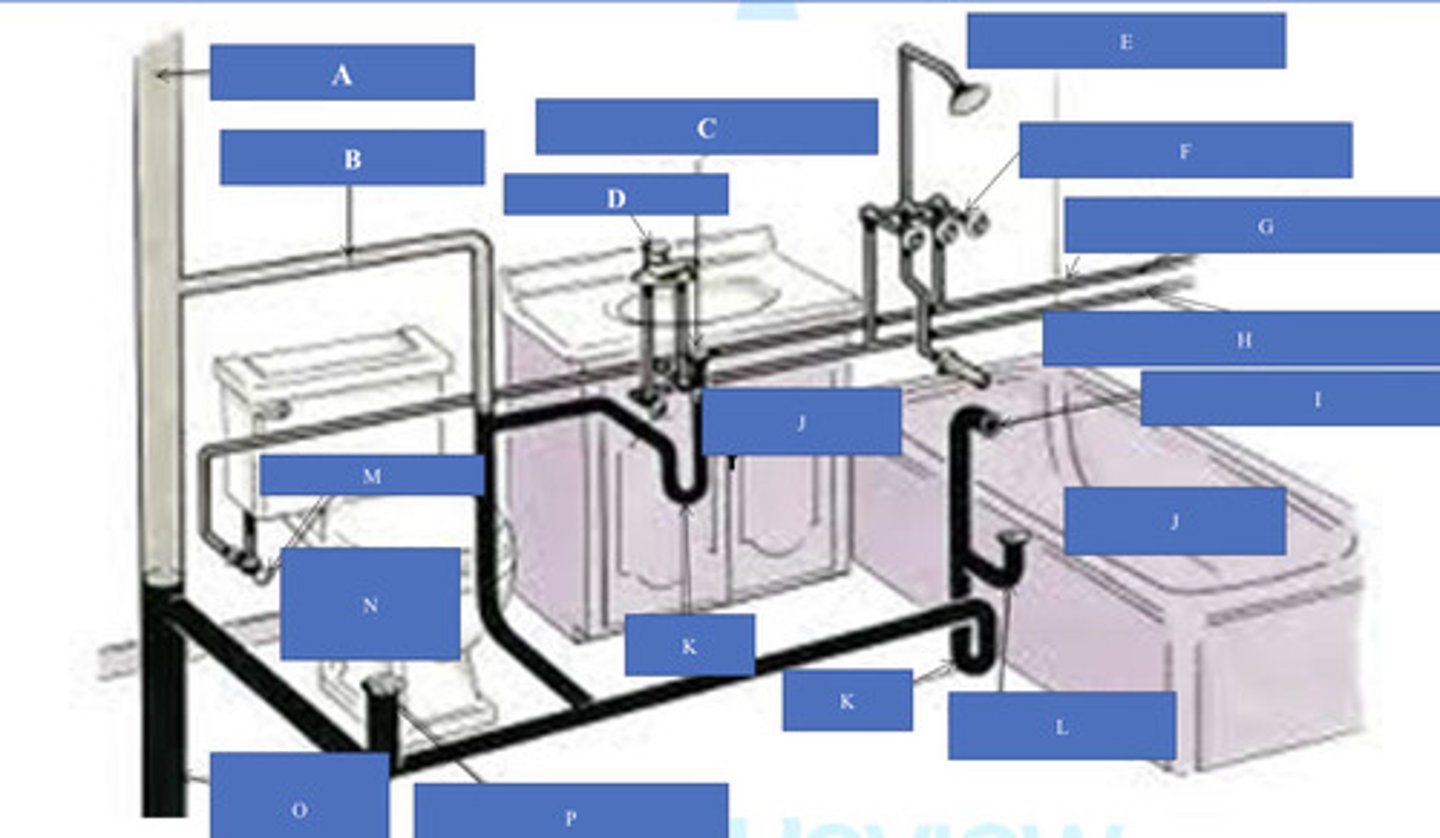
B. lavatory drain
Determine the Label C.
A. Trap pipe
B. lavatory drain
C. Elbow pipe
D. Sanitary pipe
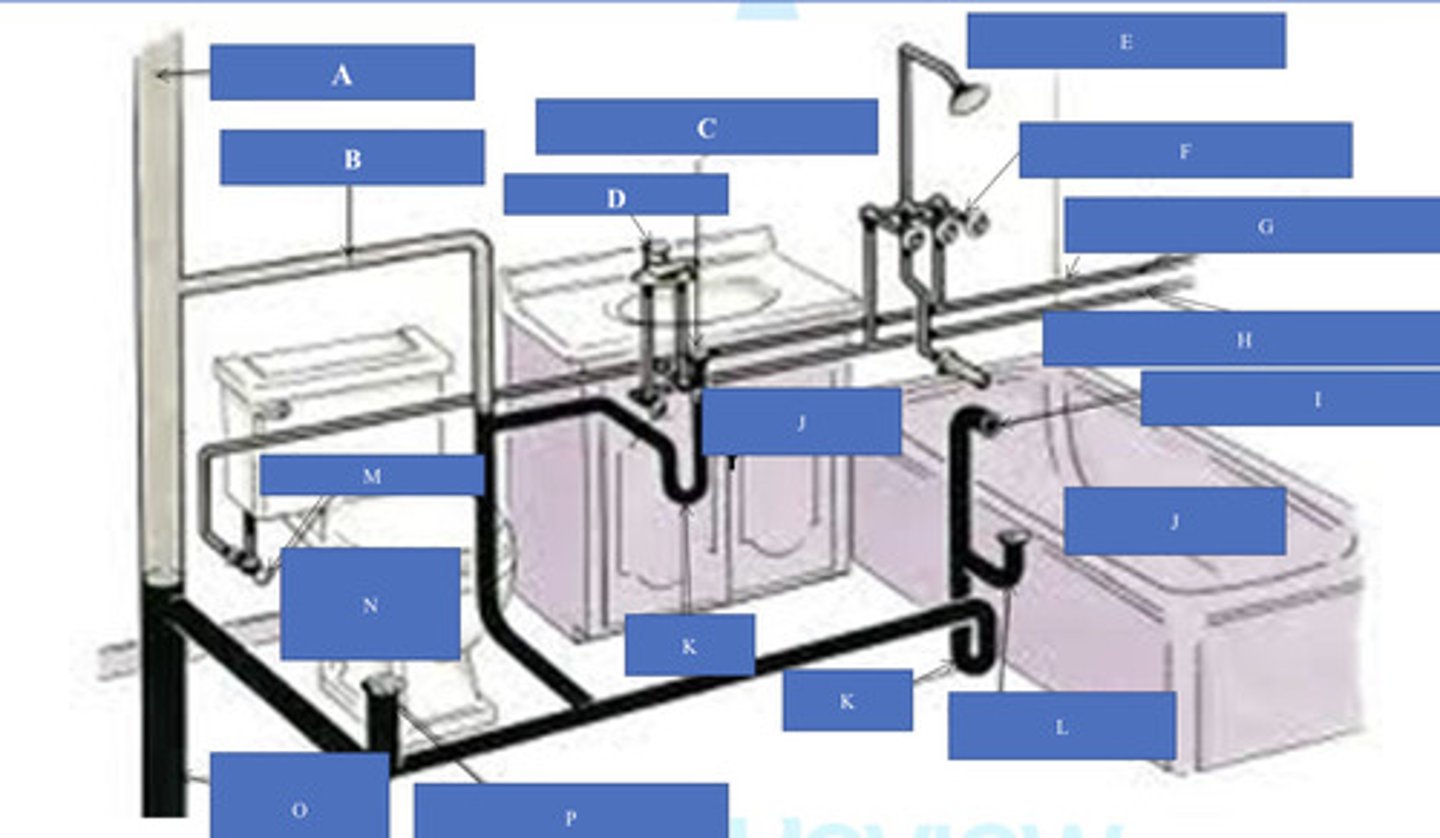
D. Shower head
Determine the Label E
A. Shower pipe
B. Shower cap
C. Shower end
D. Shower head
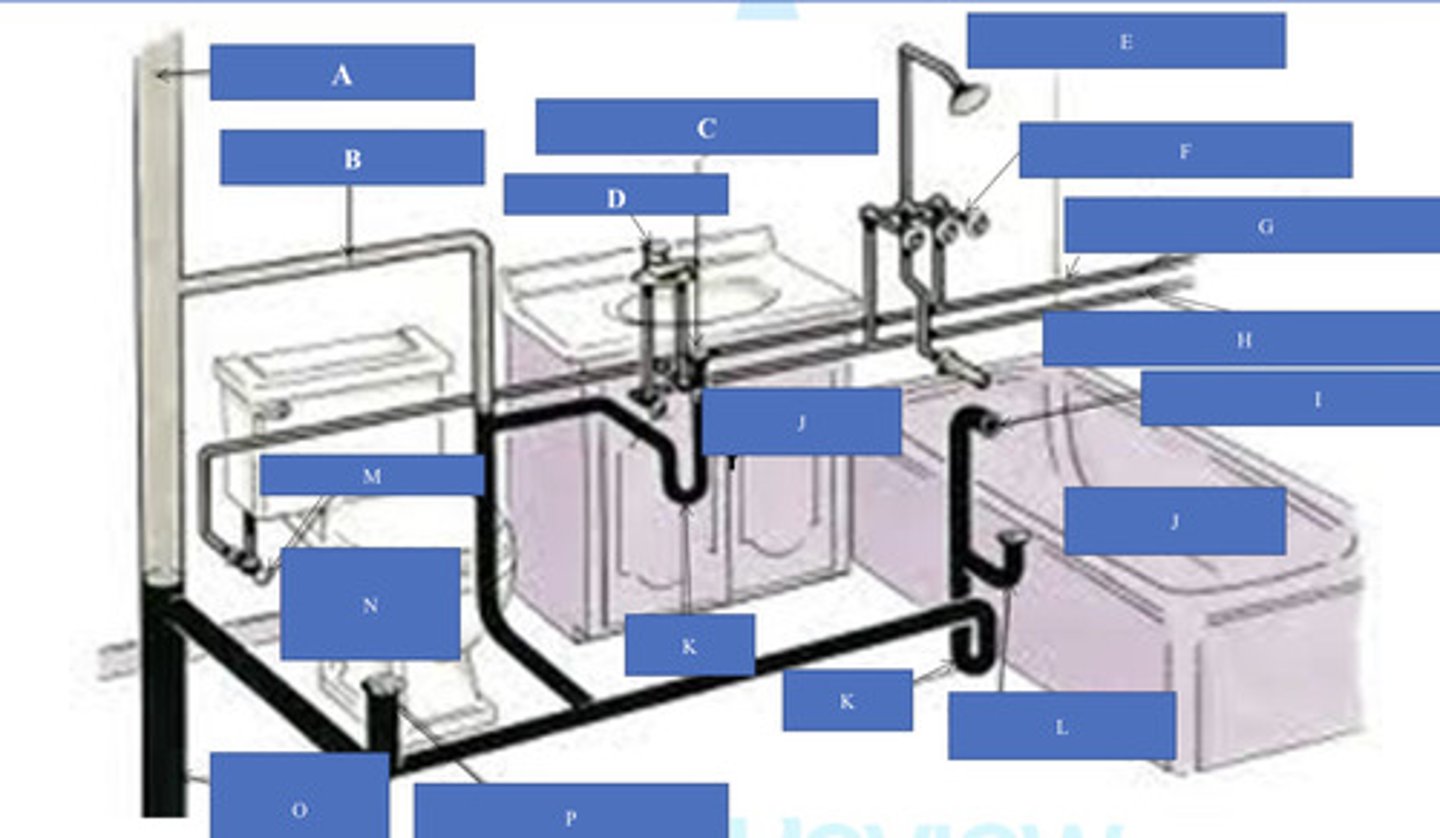
C. Cold water supply
Determine the Label G
A. Fuel supply
B. Gas pipe
C. Cold water supply
D. Liquified pipe
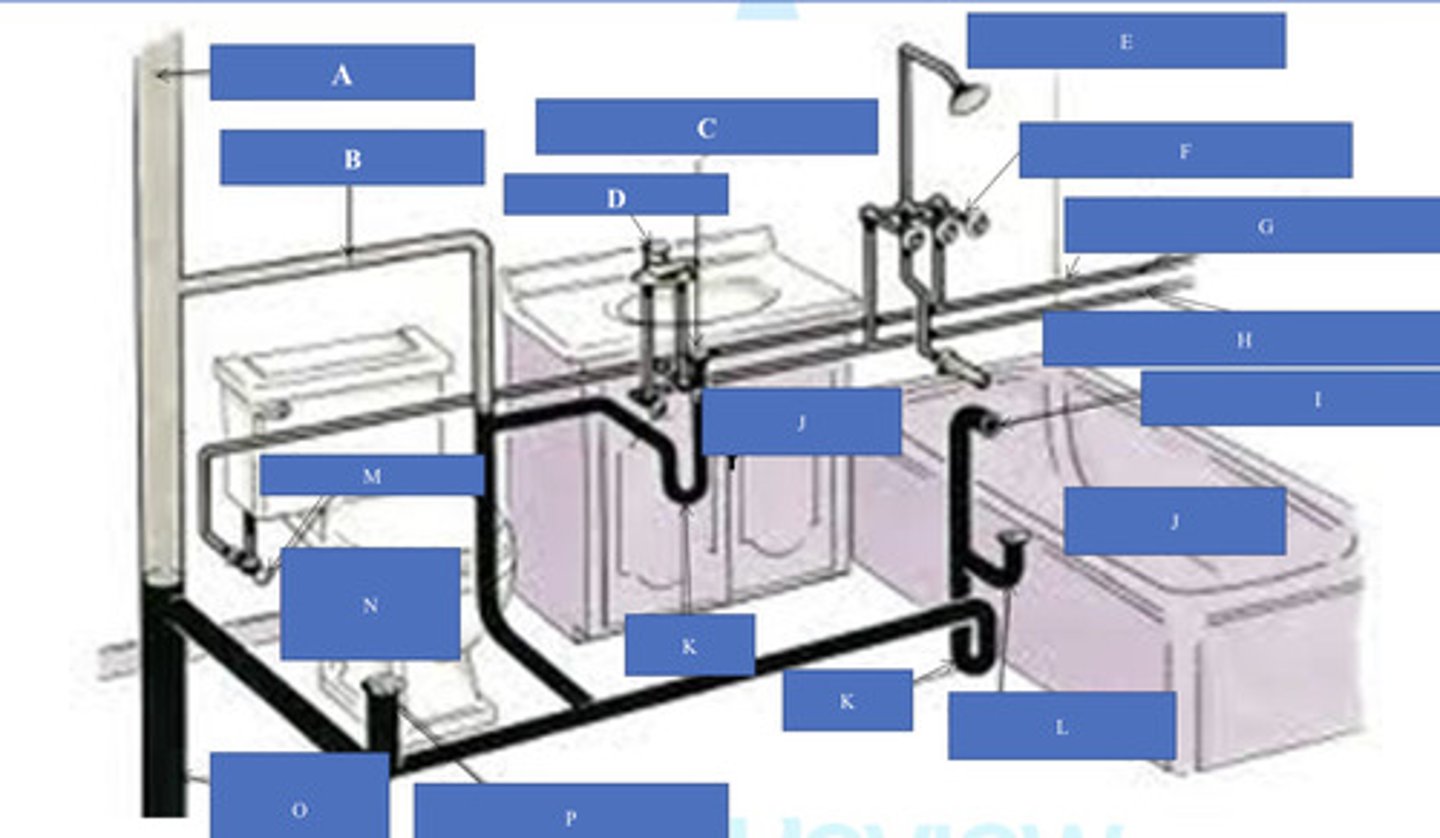
C. Trap
Determine the Label K.
A. P pipe
B. U - pipe
C. Trap
D. S pipe
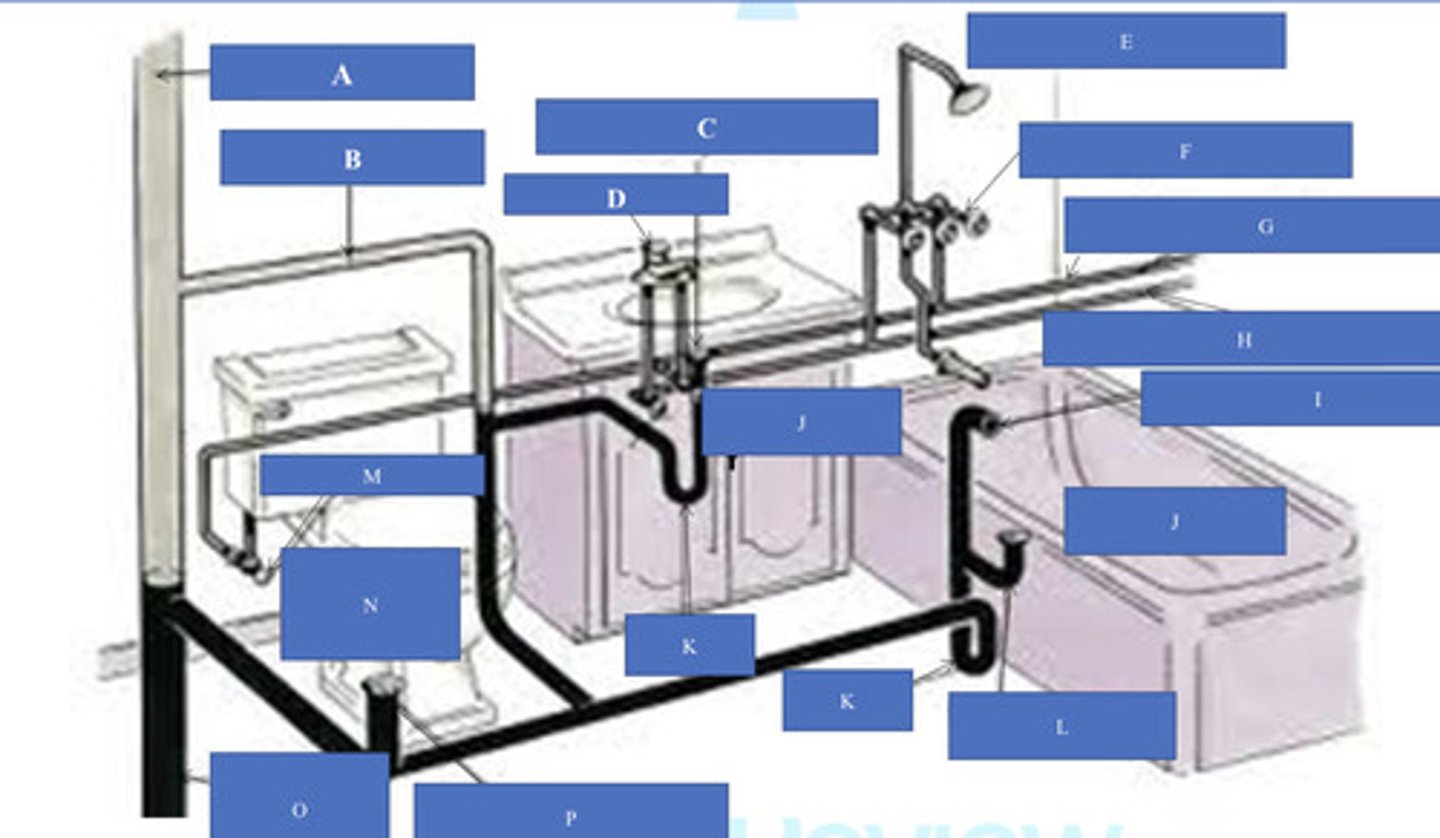
A. Tub drain
Determine the Label L.
A. Tub drain
B. Elbow pipe
C. Trap pipe
D. none of these
D. Shut off valve
Determine the Label M.
A. slip valve
B. gate valve
C. globe valve
D. Shut off valve
B. Water closet
Determine the Label N.
A. Bowl
B. Water closet
C. Lavatory
D. Bath tub
D. Soil Stack
Determine the Label O.
A. Vent stack
B. Stack vent
C. Stack soil
D. Soil Stack
B. Toilet drain
Determine the Label P.
A. P pipe
B. Toilet drain
C. U pipe
D. S pipe